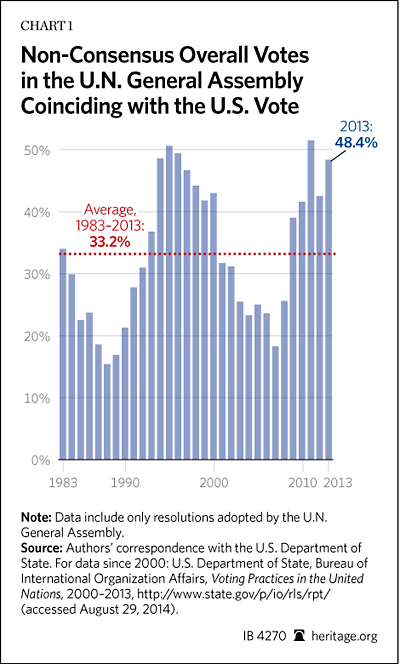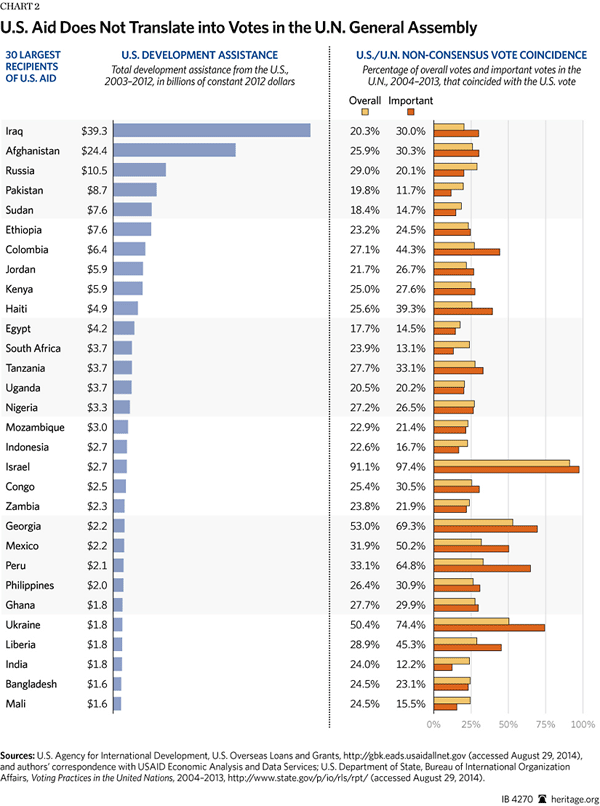Congress has long been concerned that countries receiving American foreign aid frequently oppose U.S. initiatives and priorities in the United Nations. Since 1983, Congress has required the U.S. Department of State to prepare an annual report on the frequency with which other countries vote with the U.S. in the U.N. General Assembly (UNGA).
In the three decades that these reports have been compiled, voting coincidence with the U.S. by all UNGA member states has surpassed 50 percent only twice. Moreover, the vast majority of U.S. foreign assistance recipients routinely oppose U.S. diplomatic initiatives and vote against the U.S. most of the time. The most recent report confirms yet again that most foreign aid recipients voted against the U.S. in the UNGA in 2013.
In reshaping U.S. policy to serve American interests in the international organization more effectively, Congress should link disbursement of U.S. development assistance to support for U.S. policy priorities in the U.N. Specifically, Congress should instruct the State Department and the U.S. Agency for International Development (USAID) to take into account countries’ U.N. voting patterns when allocating America’s development assistance.
Weak Support for the U.S. in the U.N.
Since 1983, Congress has required the State Department to track how individual countries vote in the U.N. and report the results to Congress in its annual Voting Practices in the United Nations report.[1] Each report includes tables listing the percentages of countries’ votes that coincided with the U.S. position on U.N. Security Council and UNGA resolutions, including consensus and non-consensus votes and votes deemed “important” by the State Department. These reports serve as a unique and valuable source of information for gauging support for U.S. priorities and policies and show that, to the detriment of American interests, the U.S. is often in the minority at the U.N.
Most UNGA resolutions are adopted by consensus—i.e., without a recorded vote or dissent. For instance, 200 of 290 resolutions (68.97 percent) were adopted by consensus during the 68th UNGA session in 2013,[2] which is typical of recent U.N. sessions. Although some consensus decisions are the result of prolonged negotiation, it is difficult to separate the significant consensus votes from those that are of little substance.[3] Therefore, analysis is better focused on non-consensus votes—when actual votes are taken on resolutions and, by definition, involve substantive matters on which member states disagree—where there is a transparent metric for measuring support for U.S. positions.
Voting coincidence with the U.S. in the UNGA on overall non-consensus votes has averaged 33.2 percent since the State Department’s first report. The all-time low was 15.4 percent in 1988. Since 1983, voting coincidence with the U.S. has been higher than 50 percent only twice—in 1995 and 2011.

Since 2000, voting coincidence in the UNGA on overall non-consensus votes has averaged 33.6 percent, although it has improved in recent years. In 2013, voting coincidence with the U.S. was 48.4 percent, which was 5.9 percentage points higher than the previous year’s 42.5 percent.[4]
As part of the report, Congress instructed the State Department to annually identify important issues and report on support for them.[5] These resolutions also offer insight into support for U.S. positions, because they are generally subjects of intense U.S. lobbying. On important non-consensus votes, voting coincidence with the U.S. was 58.6 percent in 2013, significantly higher than 2012’s 35.4 percent.[6]
U.N. General Assembly: Most Foreign Aid Recipients Vote Against the U.S. Most of the Time
Every U.N. voting report between 1999 and 2009 listed U.S. foreign assistance disbursements to each nation in addition to its voting coincidence with the U.S. However, the Obama Administration ended this practice and since 2010 has failed to include foreign assistance disbursements in its reports.
UNGA voting patterns indicate (and analysis confirms) that the U.S. neither effectively rewards countries that support U.S. priorities in the U.N. nor withholds assistance from countries that consistently oppose U.S. priorities.[7] Most major recipients voted against the U.S. more often than they voted with the U.S.
Over the past 10 UNGA sessions covering 2004 to 2013, 178 countries received development assistance from the U.S. in the year immediately preceding the UNGA session.
- Over that period, average voting coincidence with the U.S. among U.S. development aid recipients the year after receiving aid was 33.7 percent on overall non-consensus resolutions and 41 percent on important non-consensus votes.
- On average, the year after receiving aid, 76.9 percent of all development assistance recipients (137 out of a total of 178 recipient countries) voted against the U.S. in at least half of overall non-consensus votes, and 66.9 percent voted against the U.S. in at least half of important non-consensus votes.
- Of these countries, 131 countries received development assistance each year. The voting coincidence with the U.S. among this subset was 31.6 percent on overall non-consensus resolutions and 38.5 percent on important non-consensus votes. Thus, on average, regular aid recipients were less likely than periodic recipients to vote in line with the U.S.
In 2012, 166 countries received development assistance from the U.S.
- Average voting coincidence with the U.S. during the 68th UNGA session among these recipients of U.S. development aid was 46.3 percent on overall non-consensus resolutions and 55.9 percent on important non-consensus votes.
- On average, 71.7 percent of all development assistance recipients (119 out of a total of 166 recipient countries) voted against the U.S. in at least half of overall non-consensus votes, and 51.8 percent voted against the U.S. in at least half of important non-consensus votes.
Chart 2 summarizes voting coincidence with the U.S. for the 30 largest recipients of U.S. development assistance (cumulatively between 2003 and 2012). Of these 30 countries, 27 voted against the U.S. in a majority of the overall non-consensus votes over the past 10 UNGA sessions, and 25 voted against the U.S. in a majority of the important non-consensus votes over the past 10 UNGA sessions.
Of particular note, on average, 16 countries that were not included on that list but also received significant U.S. assistance of over $500 million between 2003 and 2012 voted with the U.S. less than 25 percent of the time on both non-consensus votes and important non-consensus votes over the past 10 UNGA sessions.[8]
What the U.S. Should Do
America’s engagement with the U.N. is multifaceted and serves as an important vehicle for discussing many of today’s complex global challenges. To protect and advance its interests, the U.S. should:
- Require that information on foreign assistance be included in the annual U.N. voting report to Congress. The Obama Administration stopped including data on foreign assistance in its most recent reports. Congress should require that State include this information in future reports.
- Link U.N. voting to eligibility for U.S. development assistance. Other priorities often override support for U.S. positions in the U.N. As a result, many countries believe that they can oppose American priorities and initiatives without consequences. Congress should instruct the State Department and USAID to take into account U.N. voting when dispersing development assistance.
- Engage directly with Washington embassies on U.S. priorities in the U.N. Sometimes U.S. priorities at the U.N. and communications to U.N. country missions in New York from U.S. officials are not passed on to national governments and therefore do not have the desired effect of changing votes on key issues. Communicating U.S. priorities through Washington embassies provides an alternative means for messages to reach decision-makers in other governments and can help circumvent parochial U.N. politics and relationships that can influence votes by country missions in New York irrespective of the wishes of their governments.
Time to Link U.S. Foreign Aid to Support for U.S. Priorities in the U.N.
The United States, the largest contributor to the U.N. budget, has steadfastly supported the founding ideals of the U.N. It is clearly in America’s interest to work with the U.N. to advance U.S. diplomatic initiatives related to these values and to facilitate cooperation with other nations to address these common concerns. In protecting and advancing American interests, Congress should seek to strengthen support for America’s priorities in the U.N. by explicitly linking U.S. foreign aid to support for U.S. priorities.
—Brett D. Schaefer is Jay Kingham Senior Research Fellow in International Regulatory Affairs in the Margaret Thatcher Center for Freedom, of the Kathryn and Shelby Cullom Davis Institute for National Security and Foreign Policy, at The Heritage Foundation. Anthony B. Kim is Senior Policy Analyst for Economic Freedom in the Center for Trade and Economics, of the Institute for Economic Freedom and Opportunity, at The Heritage Foundation.
